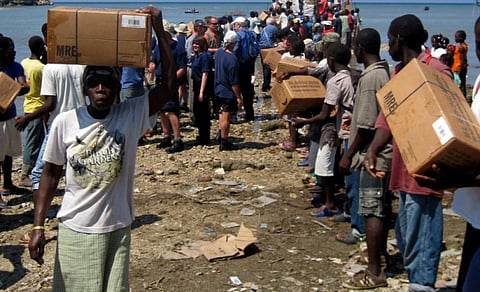

Fifty years after rich countries agreed to give 0.7 per cent of their gross national income (GNI) in aid, they have failed to deliver $5.7 trillion to the globe’s poorest, according to a study by nonprofit group, Oxfam.
This figure is nine times larger than sub-Saharan Africa’s stock of external debt at the end of 2019 of $625 billion, Fifty Years of Broken Promises, said. It was on October 24, 1970 that developed countries had made the commitment on aid.
Poor countries lost out around $114 billion a year since rich countries reneged on their ‘solemn promise’ to deliver the aid, Oxfam said.
The aid that poor countries lost as a result of donor countries’ inaction is an immeasurable debt that could have brought great changes to humanity, according to the report.
The wealth of the world’s richest man — $185.6 billion in October 2020 — is greater than the sum of all international aid budgets — $152.8 billion in 2019.
Governments spend more than twice as much subsidising fossil fuels — $320 billion in 2019 — than they do on aid.
If wealthy nations delivered on their aid commitments it would go a long way towards providing the additional $4.8 trillion needed between 2019-2030 to meet all 17 United Nations-mandated Sustainable Development Goals in the world’s 59 lowest-income countries.
If donors had kept their promises, they would have contributed to the financial gap of $3.9 trillion gap required to achieve the health SDG worldwide between 2016 and 2030.
How aid helped
Aid played an important role in tacking development and health challenges, poverty and inequality between 1970 and 2020, the report said.
The $5.7 billion of lost aid was being paid for by the 260 million children who were out of school, the half of humanity that lacked access to essential health services and the two billion people who did not have enough to eat, José María Vera, interim executive director of Oxfam International, was quoted as saying in the report.
The health programmes supported by the Global Fund to Fight AIDS, tuberculosis and malaria saved more than 27 million lives since 2000, the report said.
The Global Polio Eradication Initiative galvanised funding to vaccinate children, saving an estimated 18 million of them from paralysis and eradicating polio in many parts of the globe.
Thirty-four million children got the chance to go to school as a result of the aid package agreed at the 2000 Dakar World Education Forum.
The Civil Society Education Fund has supported national coalitions in 60 countries to advocate for better policies and more resources for education.
In Zambia, the coalition successfully lobbied for education’s share of the national budget to increase to an historic 20.2 percent high in 2014.
International aid funds entire social protection programmes in 7 countries of sub-Saharan Africa. In Zambia, it helped mobilise the resources needed to increase the number of health workers to 17,000 from 12,000 between 2005 and 2010.
Donors had failed completely on their promises to grant climate finance too, Oxfam pointed out recently.
Aid during COVID-19
Oxfam’s estimates were released after nearly 10 months of the novel coronavirus disease (COVID-19) pandemic when international aid has never been more important
The world is projected to have 150 million ‘new extreme poor people’ in 2021, as a result of COVID-19. Yet just 28 per cent of the $10.19 billion the UN requested to help poor countries tackle the crisis has been pledged to date.
High income countries spent just 0.3 per cent of their GNI on international aid in 2019, Oxfam said. Only five countries — Luxembourg, Norway, Sweden, Denmark and the UK — met or exceeded the 0.7 per cent target, it added.
Donor countries have also violated international standards by diverting grants to support their national or commercial interests.
In 2016, donors awarded 51 per cent of the aid contracts they report to the Organisation for EConomic Cooperation and Development to their own domestic companies, and just seven per cent to suppliers in low-and middle-income countries.
Oxfam’s findings were released after G20’s disappointing response on the debt relief required by the developing countries to overcome social and economic crisis due to the pandemic.
The non-profit group called for a renewed political commitment to international aid and a move from a charity-based system to one based on justice.